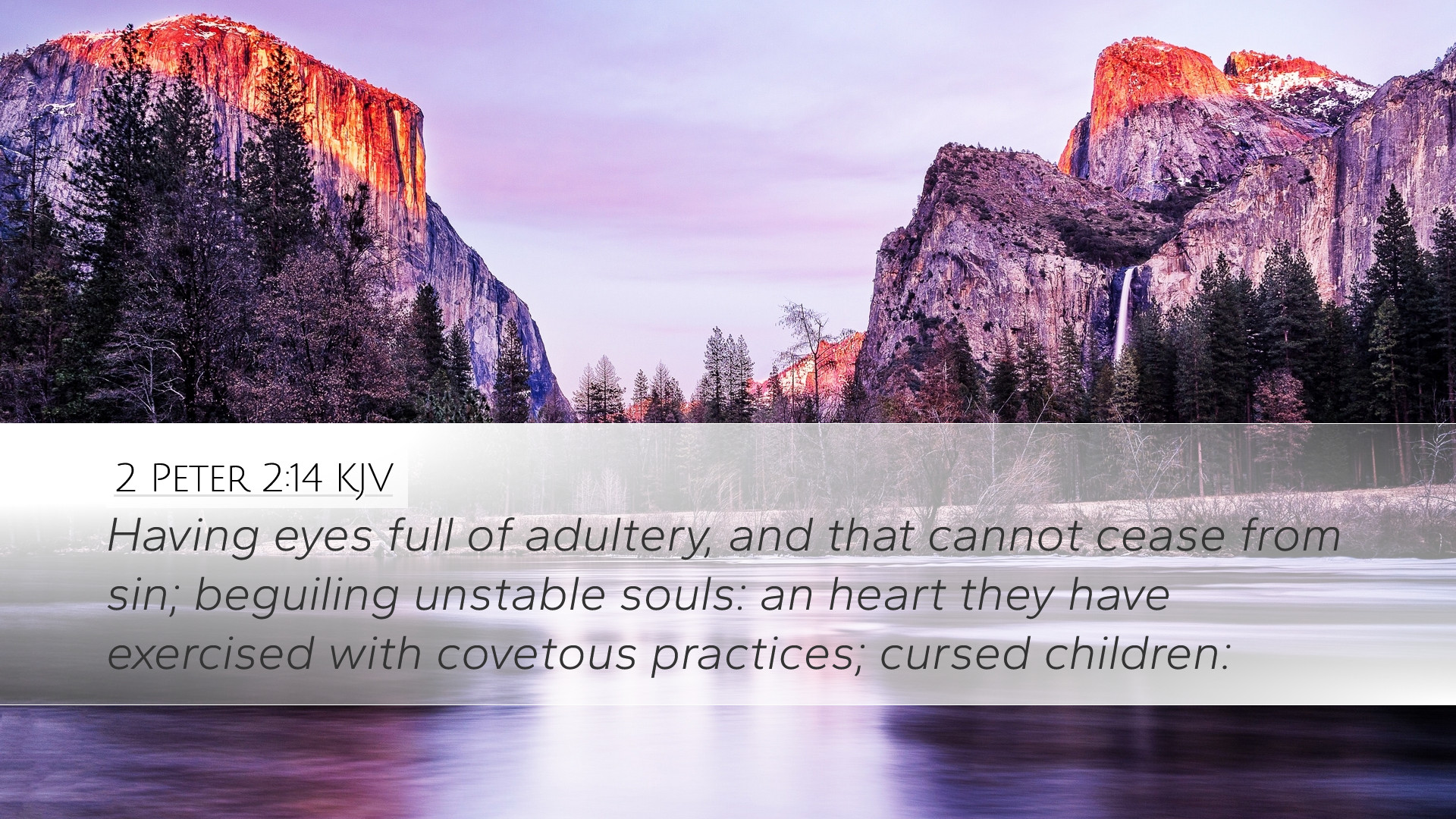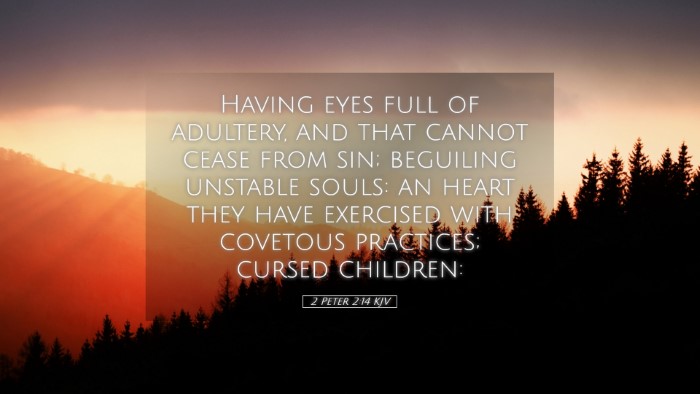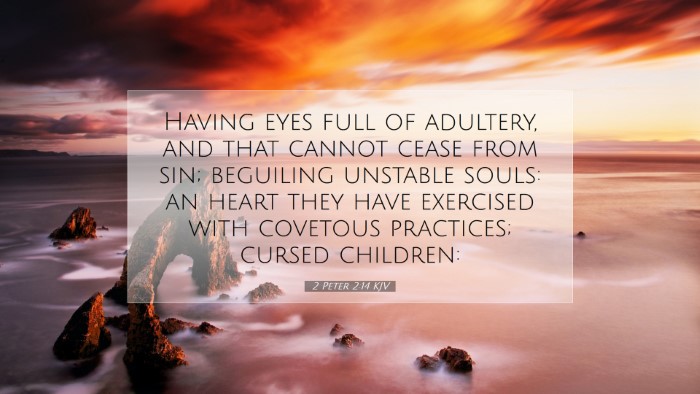Old Testament
Genesis Exodus Leviticus Numbers Deuteronomy Joshua Judges Ruth 1 Samuel 2 Samuel 1 Kings 2 Kings 1 Chronicles 2 Chronicles Ezra Nehemiah Esther Job Psalms Proverbs Ecclesiastes Song of Solomon Isaiah Jeremiah Lamentations Ezekiel Daniel Hosea Joel Amos Obadiah Jonah Micah Nahum Habakkuk Zephaniah Haggai Zechariah Malachi2 Peter 2:14
2 Peter 2:14 KJV
Having eyes full of adultery, and that cannot cease from sin; beguiling unstable souls: an heart they have exercised with covetous practices; cursed children:
2 Peter 2:14 Bible Commentary
Commentary on 2 Peter 2:14
Verse Context: 2 Peter is a letter that addresses the early Christian community, warning them about false teachers and the dangers of immoral living. Chapter 2 serves as a dire caution against those who distort the truth of the Gospel for personal gain.
Text of 2 Peter 2:14
“Having eyes full of adultery, and that cannot cease from sin; beguiling unstable souls: an heart they have exercised with covetous practices; cursed children:” (KJV)
Exegesis and Analysis
This verse encapsulates the character and conduct of false teachers, those who are deceptive and lead others astray. Each part of the verse reveals significant insights into their motivations and the consequences of their actions.
Eyes Full of Adultery
Matthew Henry observes that the phrase “eyes full of adultery” indicates a heart that is unfaithful and lustful. This imagery suggests not only sexual immorality but also a broader sense of infidelity to God, reflecting a covetous spirit toward the treasures of the world.
Albert Barnes expands on this description, suggesting that the “eyes” are emblematic of the desire to lure others into sin. The eyes, as the windows to the soul, reflect the internal corruption and sinful intentions that drive these false prophets.
Cannot Cease from Sin
The inability to cease from sin highlights a perpetual state of depravity. Adam Clarke elucidates that this speaks to an innate bondage to sin; these individuals are not merely tempted but are entrapped in a cycle of unrighteousness. Their resistance to repentance serves as evidence of their deceitful nature.
Matthew Henry further adds that such people exhibit “an utter want of shame,” as they habitually engage in sinful acts without any intention of turning back to righteousness.
Beguile Unstable Souls
The act of beguiling the unstable souls illustrates a pivotal strategy employed by false teachers. Albert Barnes points out that unstable individuals are easily misled; they lack grounding in the faith and thus become targets for deceit. The term "unstable" refers to those who are not firm in their beliefs, susceptible to errant doctrines and bad influences.
This reflects a broader theme found within Scripture, which emphasizes the need for believers to be rooted in truth, as seen in Ephesians 4:14, where the danger of being "tossed to and fro" by every wind of doctrine is articulated.
Heart Exercised with Covetous Practices
The term “exercised” implies a relentless pursuit or practice. Adam Clarke notes that their hearts are not merely inclined toward these desires, but actively engaged in them. This active sinfulness creates a pattern of behavior reflective of their nature as false teachers, revealing their integrity’s decay.
Matthew Henry asserts that these covetous practices manifest as greed, drawing parallels between spiritual corruptions and material desires. Their motivations are not of spiritual edification; rather, they seek personal gain at the expense of the flock.
Cursed Children
The designation “cursed children” denotes the severity of their fate. Albert Barnes indicates that they are under divine condemnation, a reference to both their spiritual status and impending judgment. The scriptural phrase serves as a stark reminder that those who pervert God’s truth for self-serving agendas face grave consequences.
In this light, Matthew Henry comments on the gravity of such a curse, reinforcing the need for accountability within the body of Christ. As leaders and shepherds of the flock, recognizing and avoiding deception is crucial to collectively maintaining the church's integrity.
Practical Applications
The passage highlights essential lessons for modern believers, particularly pastors, students, and theologians:
- The Importance of Discernment: Just as the early church faced false teaching, contemporary believers must cultivate discernment through Scripture and sound doctrine.
- Accountability: The church must foster environments where leaders are held accountable for their teachings and conduct, thereby protecting the spiritual health of the community.
- Commitment to Righteousness: Believers are called to remain vigilant against personal and corporate sin, striving for holiness in every aspect of life.
- Encouragement of Strong Faith: Instilling sound doctrine and encouraging deep biblical engagement within the congregation can prevent individuals from being misled.
Conclusion
In summary, 2 Peter 2:14 serves as a potent warning against the nature of false teachers within the Christian community. By reflecting on insights from Matthew Henry, Albert Barnes, and Adam Clarke, contemporary believers gain a deeper understanding of the spiritual dangers that persist today. The verse implores the church to remain steadfast in truth while actively guarding against those who would lead them astray.


